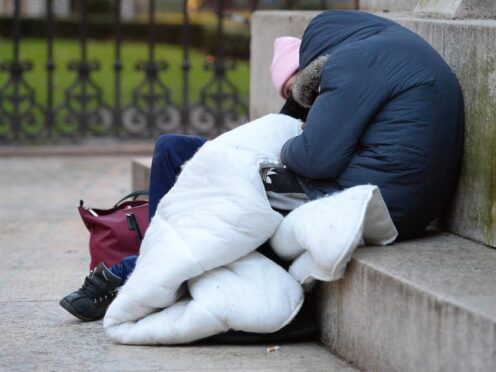
The risk of homelessness among Ukrainians who fled to the UK to escape the war is likely to increase as more sponsorships end or break down, MPs have warned.
A new report from the Public Accounts Committee said it had asked the Government why it did not have a “full and accurate picture” of homelessness among people on the Homes for Ukraine scheme.
It noted that 30% of English local authorities “regularly failed to provide homelessness data” for those on the scheme.
Its report said the Department for Levelling Up, Housing and Communities (DLUHC) explained that the data it received from more than 70% of local authorities was “representative and sufficient to track trends so that it could respond accordingly with policy interventions”.
But the committee said: “We are concerned that the risk of homelessness among Ukrainians in the UK is likely to increase as more sponsorships end or break down.”
The MPs said that by the end of August last year, local authorities had reported that 4,890 Ukrainian households in England who were in the UK on Homes for Ukraine visas had been homeless or come within 56 days of being homeless.
The report added that, since the beginning of 2023, “at any one time, between 600 and 800 Ukrainian households have been living in temporary accommodation in England, although DLUHC does not know how many of these households are part of the Homes for Ukraine scheme”.
The MPs recommended the department should increase the number of local authorities that regularly provide homelessness data and secure an adequate supply of sponsors for the scheme in the future in a cost-effective way.
The report also said a slowdown in processing visas “is leaving some Ukrainians facing an unacceptably long wait for decisions to be made on their applications”.
It said that despite changes brought in by the Home Office, “visa turnaround times have taken longer since June 2022” with 63% of visa applications taking more than the 15 working day target to be processed in July 2023, compared to 19% in June 2022.
MPs urged the department to set out its plan for if there is a future surge in applications, and to publish quarterly updates on visa processing times for the remainder of the scheme.
The report was put together before the Government’s recent announcement of an 18-month visa extension scheme, something committee chair Dame Meg Hillier welcomed.

However, concerns have been raised over the Home Office’s closure of the Ukraine family scheme which happened on Monday afternoon.
The Ukraine family scheme allowed applicants to join family members or extend their stay in the UK.
An extension scheme, which meant Ukrainian nationals and their immediate relatives could apply for permission to remain in the country, is due to close on May 16.
Dame Meg said: “We look forward to hearing how much more certainty it (the Government) is able provide to those staying in the UK, particularly in light of the recent closure of the Ukraine Family Scheme.
“As the war has continued the challenge now is that thousands of Ukrainian households were homeless or close to it last year.
“Not only is this a huge problem but our report finds that there is no full oversight of homelessness within the scheme itself.
“There are of course factors here which make long-term planning challenging, not least the continuing uncertainty in Ukraine itself. But the Government must ensure it has a plan to support those who have sought safety in the UK.”
The report said while the Homes for Ukraine scheme had been set up at speed and helped tens of thousands of Ukrainians come to the UK, the department “does not know fully what aspects of the scheme have or have not worked and whether overall the scheme has been value for money”.
The MPs said the department should set out its plans to evaluate the scheme, including how lessons learned and best practice examples could be used for potential future resettlement schemes, and a consideration of the overall value for money of the scheme.
The committee also urged the Government to set out its assessment of its commercial options once the current contract, held by tech giant Palantir, expires.
It said: “If this includes extending the contract with Palantir, DLUHC should explain how this is justified under current procurement regulations.
“In particular, how such a decision would be consistent with the Government Chief Commercial Officer’s concerns about departments accepting IT companies’ offers to provide free trial periods to gain a commercial foothold.”
The latest figures showed that there had been 200,600 arrivals of Ukraine Scheme visa-holders in the UK as of February 19.
There had been 56,900 arrivals through the Ukraine Family Scheme and 143,700 through the Homes for Ukraine scheme (also know as the Ukraine Sponsorship Scheme).
Roger Gough, from the Local Government Association, said housing shortages “compounded by the pressures of multiple asylum and resettlement schemes” have resulted in “a high number of Ukrainians having to turn to councils for housing and homelessness support”.
He called for an “urgent review” of the funding arrangements for councils as well as existing and new hosts which he said “were designed to fund temporary sanctuary”.

Enjoy the convenience of having The Sunday Post delivered as a digital ePaper straight to your smartphone, tablet or computer.
Subscribe for only £5.49 a month and enjoy all the benefits of the printed paper as a digital replica.
Subscribe